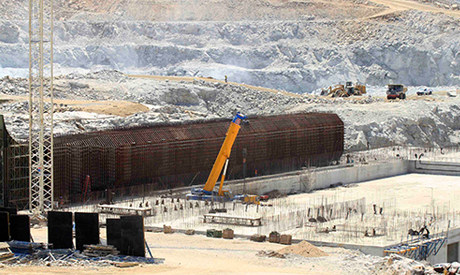Date: Thu, 19 Nov 2015 16:01:17 +0100
Menna Alaa El-Din,
Thursday 19 Nov 2015

Informed sources told Ahram that the reason behind the delay was "the Ethiopian irrigation minister’s foreign commitments and official visits.”
The source highlighted the importance of the participation of the three countries’ irrigation ministers in the round of talks taking place in Sudan’s Khartoum, in the presence of the two conflicting foreign consultancy firms hired to provide a study on the effects of the dam.
In September, Dutch consultancy firm Deltares withdrew from the assessment of the dam, saying that the conditions imposed by the tripartite national committee -- which includes representatives from Egypt, Sudan and Ethiopia, as well as the French consultancy firm BRL -- did not provide sufficient guarantees to Deltares that an independent high-quality study could be carried out.
The tenth round of talks was a chance for the three concerned countries to mediate differences between Deltares and BRL.
The sources said that, "there are current intense talks being undertaken by Egypt’s irrigation and foreign affairs ministers to set a date for an upcoming summit."
It’s unclear where and when the summit will take place, but it may be held upon recommendations from the experts from Egypt, Ethiopia, and Sudan who attended the ninth round of talks in Cairo last week.
Sources said that Egypt is pushing to hold the summit before the suggested Khartoum round of talks, or before Christmas break in December.
The summit will be held between the ministers of the three countries to establish a final agreement over the mechanism needed to execute the mandatory studies about the effects of the dam, as well as executing the fifth principle from the declaration of principles signed in March 2015 by the presidents of Egypt, Sudan, and Ethiopia.
The fifth principle includes details about the dam's storage reservoir’s first filling, and dam operation policies.
One of the policies, including others, designates that ‘’the three countries should cooperate to use the final findings in the studies recommended by the Tripartite National Technical Committee and international technical experts in order to reach an agreement on the guidelines for different scenarios of the first filling of the Grand Ethiopian Renaissance Dam reservoir in parallel with the construction of the dam."
Last Tuesday, Egypt's Prime Minister Sherif Ismail stated in press conference in Sharm El-Sheikh that Egypt still has three concerns related to national security and the Grand Ethiopian Renaissance Dam.
According to Ismail, these concerns are “Egypt's historical water share from the Nile river, making sure that the dam will not affect Egypt's water share, and ensuring that the Grand Ethiopian Renaissance Dam is not used for any political purpose other than generating electricity.”
Egyptian officials have repeatedly expressed concerns that Ethiopia's $4.2 billion dam on the Blue Nile, the construction of which is said to be at least 40 percent complete and is set to finish in 2017, would negatively affect its share of the Nile water.
According to the irrigation ministry, Egypt is suffering from a water deficit of 20 billion cubic metres, which it compensates through water recycling, an inadvisable process in the long term.